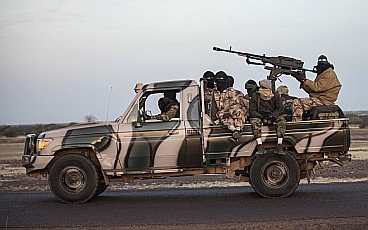Five questions on Mali to SP’s Jasper van Dijk
Five questions on Mali to SP’s Jasper van Dijk
There is still a great deal of uncertainty surrounding the conflict in Mali. We put five questions on the political and military situation there to SP Member of Parliament Jasper van Dijk.

What exactly is happening in Mali?
After the fall of the Libyan dictator Gadhafi, different rebel groups, including Al Qaida, have pulled out of Libya and into Mali, where they have attached themselves to the Tuaregs of North Mali, who are fighting for independence. This group, the MNLA, were, however, rapidly eclipsed by the well-armed international jihadists of Al Qaida who are active in the entire region. In North Mali they imposed a strict form of Sharia law and then began an advance on the south, in the direction of the capital, Bamako. Last year, partly as a result of this development, there was a coup d’état and the Malian government was removed. Mali is now run by an interim government with the support of the last remnants of the army. Within a few months elections must be held.
Why has France suddenly decided to begin a military operation in Mali?
France wants to halt the rebels’ advance on the south. That’s why they first of all began air raids and this week also sent in ground troops. A prime reason is that thousands of French people live in Bamako. In addition, economic interests in the region play a role. France extracts uranium for its nuclear power stations from neighbouring Niger, for example,.
You say that you are worried that the Netherlands will get mixed up in a war. Why?
This week the Dutch government has promised France that it will make transport planes available which “for the time being” won’t be flying to Mali. In last Wednesday’s parliamentary debate, I put a question on the number of flights, the cargo and destination. I also asked what the consequences would be for security, for example for the hundred or so Dutch citizens in Mali, one of whom is a hostage.
I scarcely received an answer, and in view of this to vote in favour would have been irresponsible. So the SP tabled a motion requesting more clarification. This motion was rejected by every party except the SP and the Animals’ Party.
In addition there are more fundamental questions which have hardly been addressed. What is the aim of the French invasion? Must the rebels simply be halted, or also driven back? How far does President Hollande’s remark that France won’t withdraw until Mali is “secure” go? Does the Dutch government support such a goal, which could lead to the West once more winding up in a lengthy, hopeless struggle? And what diplomatic efforts have been undertaken before France opted for military means? These questions have also to date received no clear answer.
The outcome of the struggle is completely unknowable. The north of Mali is as big as France. It’s naïve to state that you can pacify such a region with a few thousand soldiers. Moreover, there will be all sorts of unforeseen consequences, such as this violent hostage-taking in Algeria. New attacks and kidnappings could take place at any time.
We cannot, nevertheless, leave Africa to the jihadists?
Of course not, and it’s clear that the jihadists have a repugnant philosophy. But the question is whether you can solve this in this way. The conflict in Mali is a result of the war in Libya where western troops were also involved. Now something comparable is happening and the fighting will flare up tomorrow. Western military intervention has decidedly not put an end to this. The wars in Iraq and Afghanistan point more to the opposite effect.
In order to solve the problem in reality, you need to remove the seedbed that produces it. This is linked to countless factors, such as global inequality, the colonial past, the power of attraction of religious extremism and the conflict over resources. This demands long-term efforts and will not be sorted out by means of a brief intervention. Moreover, the jihadists range over the whole Sahara, from West to East Africa, a gigantic area which it isn’t possible to control militarily, if that’s what you’re looking to do.
A rapid success for the French armed forces would be a fine thing for the Malian people, but there is every appearance that the invasion is the start of a long drawn-out conflict. The Afghanistan scenario comes closer – years and years of occupation by a foreign power, without visible progress.
What attitude should the Netherlands adopt to this conflict?
Before the French intervention can be given support, the Netherlands must demand more information regarding its goals. We could also offer additional development aid. Shortly an EU training mission will begin, aimed at the Malian army. As long as this doesn’t amount to a battle operation, we can support that. Beyond that everything must be done to find a diplomatic resolution of the conflict with the help of countries in the region, principally Algeria.
